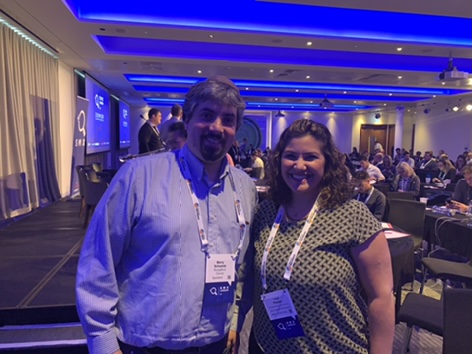It is my first time heading to SMX London. It was a great conference with loads of great insights and takeaways.
See here all event recap and summary: (you can follow up on Twitter @rliraz as well for live tweets)
#1 Conversational search- keynote Day 1 (By Jason Miller, Head of Brand, Microsoft)
Talking about voice search as a tool to the main agent: conversational AI. When you understand you’re not talking with a machine anymore, you’ve got it. The use with Cortana has grown over the years and it is now holding 18B questions to date!
“By the end of 2020 the average person will have more conversations with bots than with their wife…”@JasonMillerCA at #smxlondon #SMX
— Liraz Postan (@Rliraz) May 21, 2019
Using AI is making great conversations, great for longer user engagement sessions (6-8 minutes of conversations), 50% of users are keeping go back for more.
#2 Machine Vs Human search: By @Nagu_Rangan, Microsoft
Talking about content quality;
Trust: Can I trust the author?
Utility: Is this content helpful. Has value?
Presentation: Can I see the content clearly, to distinguish ads from the main content.
Bring unique value to search engine users, don’t fax your rankings, do not try to be an expert in everything. and don’t deceive users, no cloacking, no spam.
#3 What really matters for SEO success By @swallaceSEO, Nebo
How to optimize for Rankbrain: Today, on-site SEO is just the basics- you need to focus more on reputation and credibility.
Authority Rules: Optimizing for EAT
- Include bios for authors and provide value for this specific niche to win the expert badge.
- Improve your site engagement, create content easily shareable, people are easily able to navigate your site.
- When we’re talking about machines, if you want to optimize for Google home/assistant, you need to invest in GMB.
- Formatting your content for featured snippets is super important to get that voice search rankings position zero.
(Speaking schema is still in BETA but it is worth testing on your website)
It was a super informative session, and I recommend you to see the full deck here.
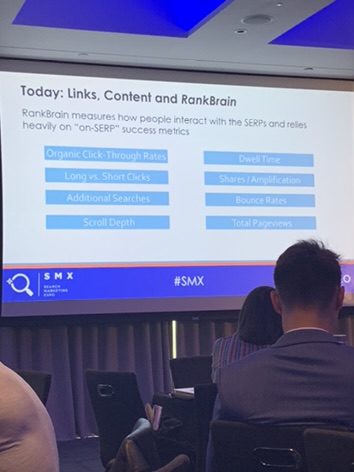
#4 Succeeding with Googl’es mobile first index: By @SC_tweets, Shane Cassells, Google
Mobile users are curious, demanding and impatient and they are using their devices to get things done.
45% of consumer are now doing their journey via mobile, but still, conversions rates are higher on desktop (3.83% vs 2.03%). The reason for that, is that we treat mobile users a second level users…
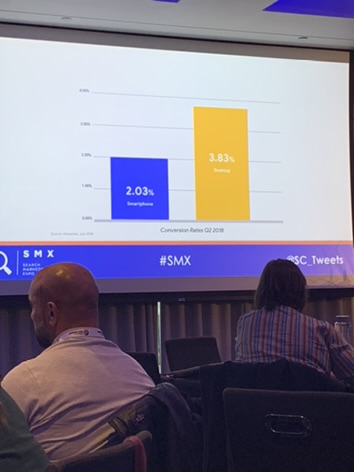
A slow site is slowing your business.
People are build JS sites because they are JS engineers and it is a good way to show-off their skills, but not necessarily building a good experience for users. The best practice is performance budget. Keep optimize, sit with an expert that will tell you what’s making your site not performing well, in terms of speed.
#5 Mobile Optimization Challenges, Vodafon, @NickWilsdon
If you want to start optimizing, start with Data and then visualize it through Google Data Studio.
integrate every 3rd party data into your reports. You can get all featured snippets data from SEO Monitor and integrate it as well.
Sistrix Toolbox can also give you more competitive landscape across mobile SERPs, and Screaming frog insights can also be added.
“Dashboard must be aligned with current team reporting KPIs.”
Full information is available through this link.
#6 What’s new with technical SEO, @rachelcostello, DeepCrawl
SEO don’t know enough about technologies and frame works and Dev’s does not know enough search. JS will never disappear… bit what about search engines? Most search engines cannot render JS or crawl links generated by JS. The solution is pre-rendering r server side rendering to make sure search engines can discover your site easily.
- Prioritise important resources for rendering and optimise the critical rendering path.
- Use a headless browser and DOM comparisons tools to analyse contents of output code (for example Diffchecker.com)
- Make sure the crucial content is always accessible. Via DeepCrawl you can crawl JS and identify any issues.
- PWA can cause rendering issues, so make sure perform through rendering and testing with Mobile friendly and Dev Chrome.
If you sit back and do nothing, Google will pick the preferred URL for you. Make sure you’re sending the best signals to search engines.
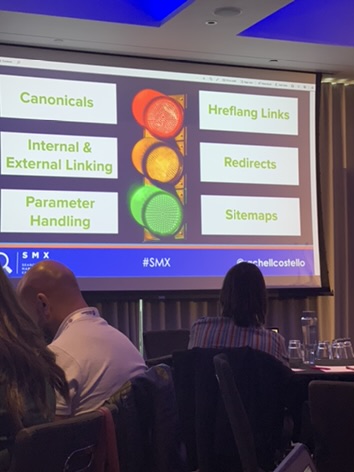
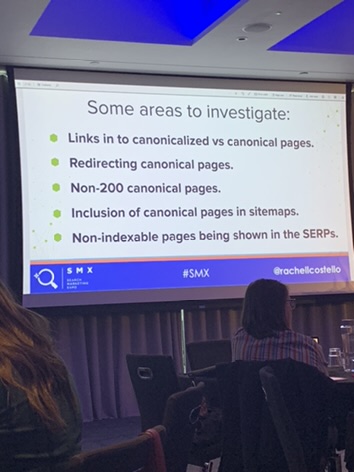
#7 Advanced Technical SEO, @basgr, @peakaceag
Let’s talk about log files! See here how log files looks like: It can vary from GA data and it is pretty hard to analyse if you don’t know what you’re looking for. You can also use Screaming Frog log file analysis which is basic, and logz.io, Loggly, CrawlOptimizer, Splunk, logrunner.io and more. You can basically get almost instant answers for anything.
With Peak Ace you combine log file data, GSC, DeepCrawl and GA all to one dashboard and getting tons of insights: errors, redirects issues, indexations issues, in links stats etc.
Deck is in here.
It can vary from GA data and it is pretty hard to analyse if you don’t know what you’re looking for. You can also use Screaming Frog log file analysis which is basic, and logz.io, Loggly, CrawlOptimizer, Splunk, logrunner.io and more. You can basically get almost instant answers for anything.
With Peak Ace you combine log file data, GSC, DeepCrawl and GA all to one dashboard and getting tons of insights: errors, redirects issues, indexations issues, in links stats etc.
Deck is in here.
#8 Featured Snippets and Strucutred Data, @jasonmbarnard
Jason has a great podcast #SEOisAEO so you gotta just listen to it, regardless of this conference. Jason talked about how to refine and filter search snippets to show the final rankings the user will see. He talked with Garry Illieys and confirmed there is no specific algo for featured snippets. The 10 blue link are the basic for EVERYTHING, so the featured snippet should be BETTER than anything. Google has only three considerations: Understanding (Entities and knowledge graph), Credibly (EAT) and Deliverability (device, time, location, format)- make sure you’re doing them right, and you’ll rank.
#9 EAT speak, breath schema markup, @joybrandon, Nebo
We are all focused on on site, EAT and voice search. So basically to implemt your schema you need to start JSON-LD , Testing constantly and hack it if you have to. It is good to use multiple markups to strengthen the reputation of an individual.
SMX Day 2
#1 Voice Search, By Aleyda Solis
How to optimize?
It’s about becoming the 1st answer now. Of course, the answer the user is getting is usually from the knowledge graph or featured snippets. The content should be organized via tables, paragraphs, lists or specific length. Oh, and you should also make sure the pages are properly sone with SEO tactics and speed. If you’re an eligible US news you can sue the speakable schema markup.
How to monitor?
On Ahrefs and SEMrush you can filter only the featured snippets and see who they are doing of performance in GA: CTR, sales, engagement etc.
How to expand?
You can go into Google assistance search console and go step by step to expand your reach by using Google’s templates for actions development. It’s super fun and no coding skills is needed.
Aleyda’s slides are available here
#2 SEO gains through Data Science, by Eun-Ji Noh, LinkedIn
The SEO team at LinkedIn is all girls power (!!) and they have tough questions, most of us as well, need to answer: How to get traffic that will be converted and bring high LTV to the product?
Find metrics that measure your progress. Should a simple and explainable metric!
Eun also talked about some important notes regarding A/B testing for SEO:
#3 A deep Dive Under the new GSC, Fili Wiese
There are great improvements in the new GSC. But there are some missing reports: Structured data report, total robots.txt errors report, Server connectivity issues/DNS and more.
Google still needs to improve their UX, as today somethings can make you crazy. GSC is still in their beginning, so there are lots of errors.
#4 All Google Penalties Explained
Google is focusing on users, and trust drives business.
Penalties are educational. Google communicates the penalties because they want to educate and reduce web spam. Bing, for example, does not have to communicate it, so their penalties are all built differently.
There are several penalties:
Algorithmic: they might feel like a penalty, but… they are not. It’s an update. Make the changes on your site to get those rankings up. Keep auditing.
Manually: the manual search team are very passionate with reducing web spam. They are trying to make the best UX for users. They get leads from many resources and they investigate and built a case and a justification if they want to penalise. Every penalty gets reviewed by other team members.
Little or no-original content: Doorway pages, USC, thin content, scraped content, affiliate programs. Google has NO problem with affiliate sites. BUT, f you have thousands of pages with the same content- then… Of course you nee to take care of it. Take action.
Spammy Structured Content: If you have a out dated schema, you might get a penalty for it. If you have 3rd party tool and integrate it on their schema. You can’t do it. It is misleading and you will get penalised for it.
Link Schemes: These are the types of link Google is trying to tackle. Try to avoid using scam links or suspicious ones. Use Disavow tool.
You can read more at: https://read.sc/penalties
When you submit a consideration request: KEEP IT SHORT. Say you sorry, and that you understand, and that you promise to get better: Remember, it is educational.
Read more on link building: https://read.sc/linkbuilding
#5 Business Impact of quick wins technical SEO, by Adrian Phipps, GSK
SEO needs to make a business sense with simple 7 steps:
- What is SEO value? Cost of your rankings if you had to buy it.
- Choose the right tools to get things done
- Identify target sites
- Choose technical SEO quick wins
- Benchmark & record
- Apply technical fixes
- Measure and report
#6 Javascript and SEO, by @bart_goralewicz
Why using it? Flexibility, community, decent UX, frameworks and so much more reasons. Since 2009 Google knows JS is everywhere, in 2014 they said they re trying to render it at scale. In 2015 they claims that they can render it (psst… not true). Only in 2018 Google recommends dynamic rendering as a workaround for their JS rendering issues. Google can render JS but they cannot do it at scale.
#7 Competitor landscape, Igal Stolpner, Investing.com
We need to have a manual research on who are our competitor. To look on their data and find the same set of keywords that all tools can agree on. You also don’t want to miss the sub folders. Go to your competitor site: read them, register, even buy from them.
Content audit: You can crawl their site, audit their popular pages and custom metrics, top pages/folders etc. You need to understand why did they outrank you: content type? Freshness? topic on page optimization, shares, internal linkings, page speed, URL structure and satisfaction.
Technical SEO opportunities: You can get ons of insights from crawling their site: number of external/internal links/ pages depth, noindex,nofollow etc.
Competitors’ new keywords can tell a whole story
#8 Awesome link building tactics via Storytelling, by @petecampbell
You can attract large number of links from sharing data, storytelling and visualisation. Sometimes it can be the simplest content/questions you can work on, to attract the best links. Answer a question that help people to make a decision.
****That’s it folks!****
Hope you had gained a lot of value from it. I had so much fun. Thanks for reading!

